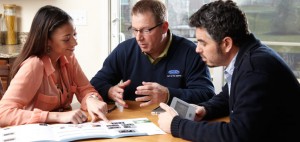Top Causes of Poor HVAC Efficiency and How to Fix Them
A home performance audit can help identify ways to improve your HVAC efficiency.
 Are you struggling with high energy bills? Your HVAC system could be suffering from some of these common efficiency issues.
Are you struggling with high energy bills? Your HVAC system could be suffering from some of these common efficiency issues.
Old Furnace or Air Conditioner
Older-generation furnaces and air conditioners are simply not as efficient as the current generation. For example, if your furnace was installed before the DOE mandated minimum AFUE ratings of 78 percent of higher, you may be wasting 30 percent of your energy dollars on fuel that never gets turned into heat. Simply upgrading to a new, high-efficiency furnace or air conditioner is an excellent way to improve your HVAC efficiency and save money on your heating and cooling bills.
Improperly Sized HVAC Unit
Another common efficiency issue is having the wrong size of HVAC system in your home. A system that is too large will cycle on and off too frequently, wasting energy, while a system that is too small will run constantly without ever really adequately heating or cooling the home. In order to make sure you have the right size of furnace or air conditioner, contact an HVAC professional who can help calculate your home’s energy loss rate, as this is every bit as important as square footage in determining appropriate HVAC system size.
Dirty Air Filters
When air filters become clogged with dust, pet dander, pollen, and other allergens, it gets harder for forced air to travel through them. This in turn reduces the efficiency of the system, as well as your comfort. Simply replacing dirty air filters is an excellent, inexpensive way to boost your HVAC efficiency.
Leaky Ductwork
Energy loss during the passage through your ductwork is a significant contributor to reduced energy efficiency. According to some estimates, a homeowner can lose up to 35 percent of the heat generated by their furnace as the air travels through attic ductwork. It is essential to ensure your duct work is properly sealed and insulated to minimize energy loss as much as possible.
Drafty Home
One final problem that commonly causes poor HVAC efficiency is a drafty or poorly insulated home. You want to strike a balance between sealing the leaks and gaps and still allowing enough ventilation to keep the indoor air fresh.
By contacting General Heating and Air Conditioning for a home performance audit, you can find out if your home is being affected by any of these common causes of HVAC inefficiency, as well as get accurate estimates for the services needed to correct these problems.
